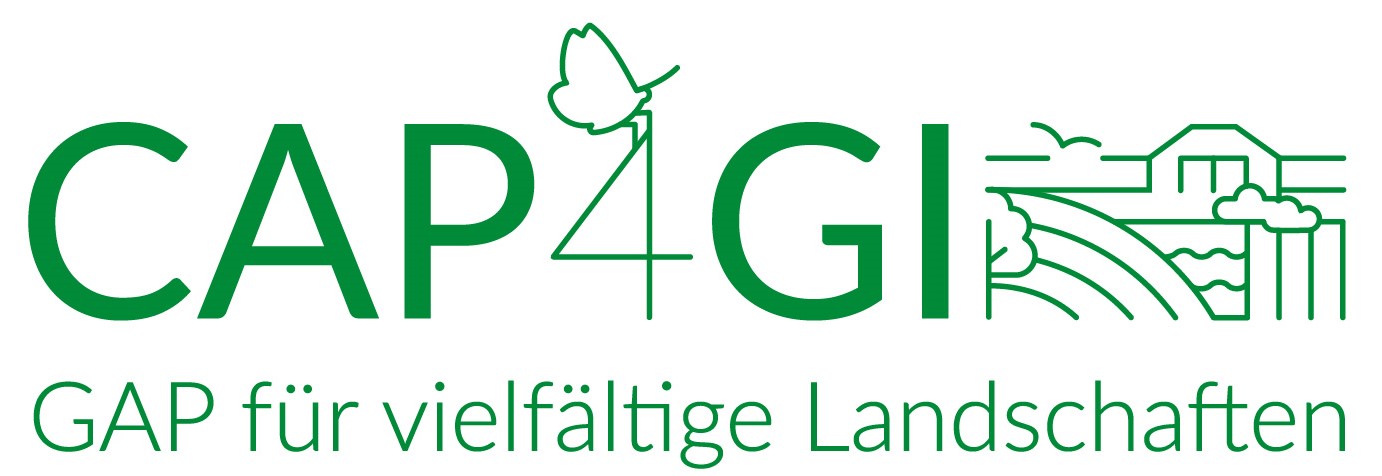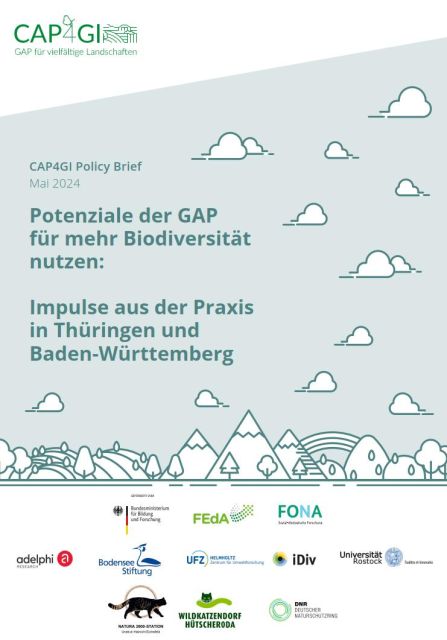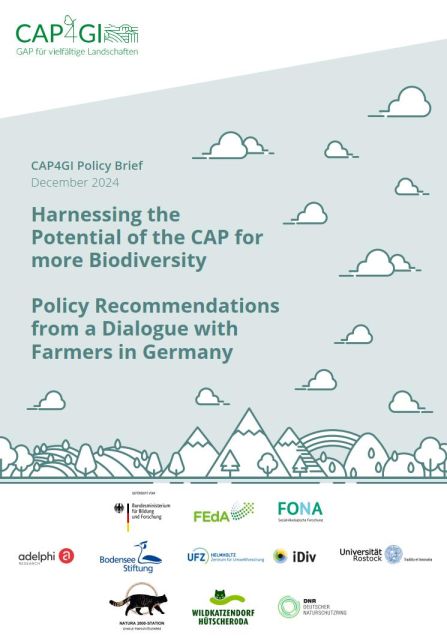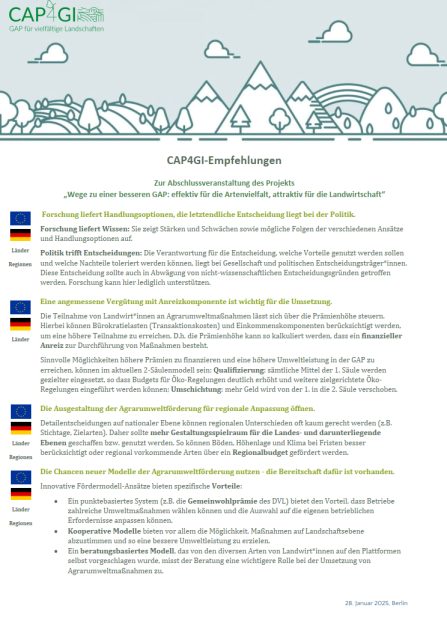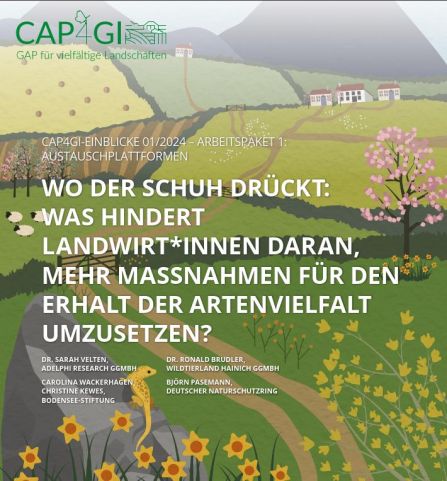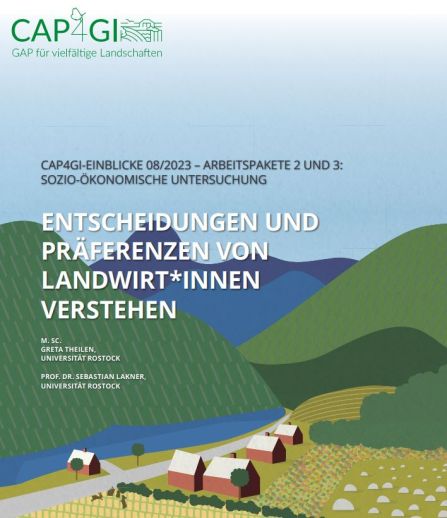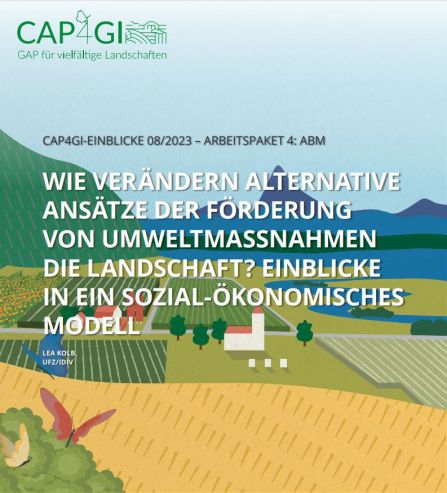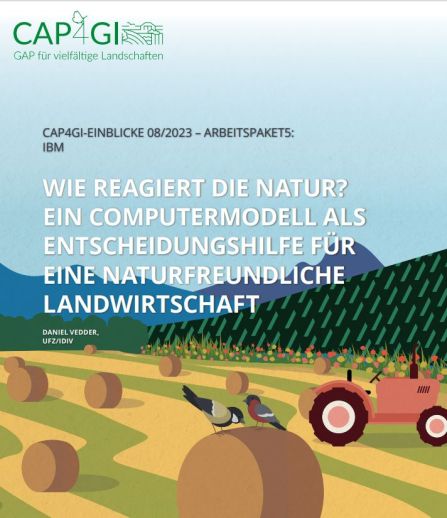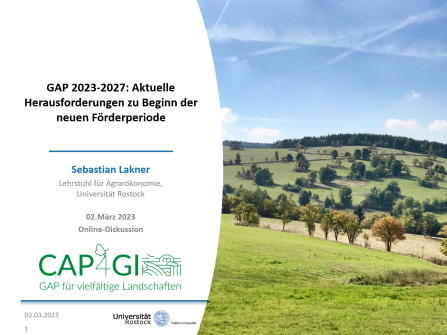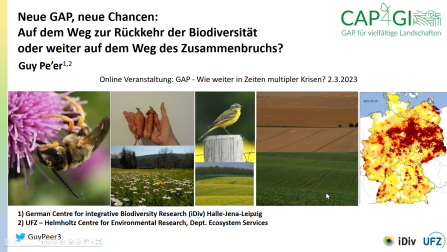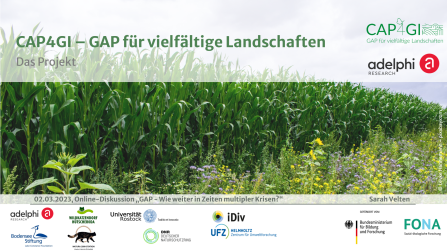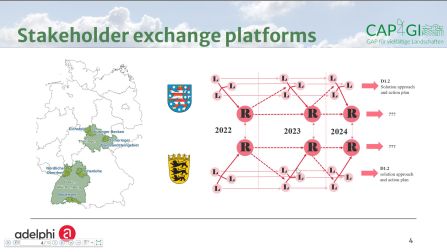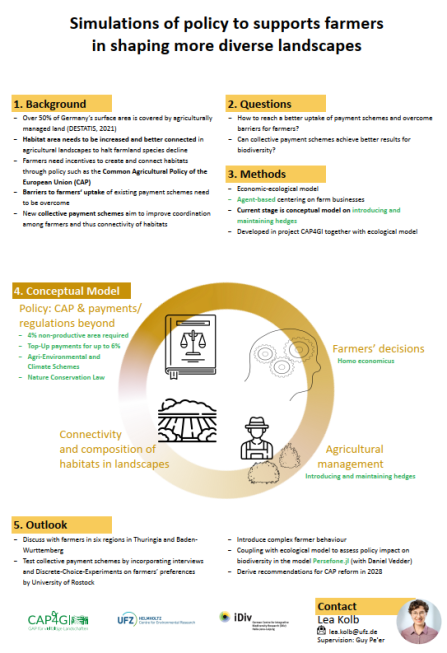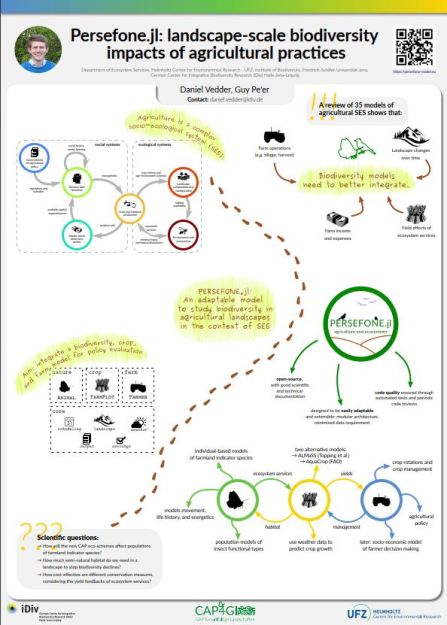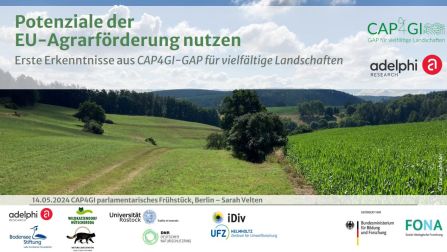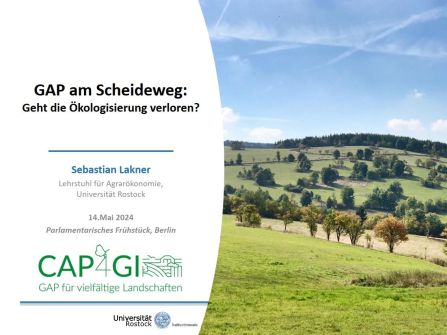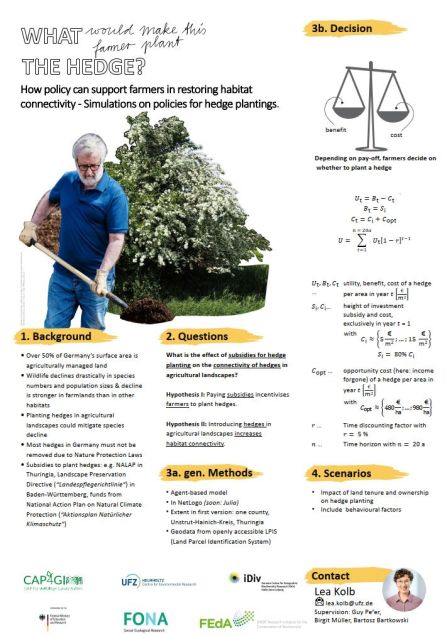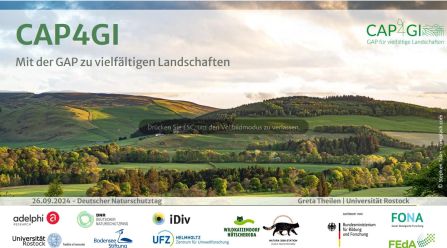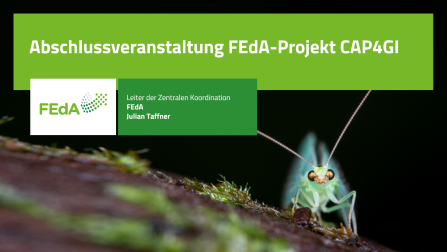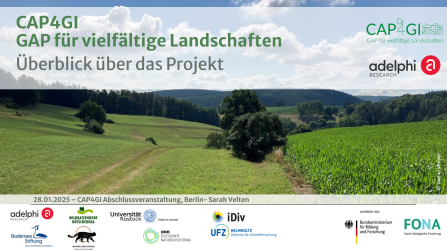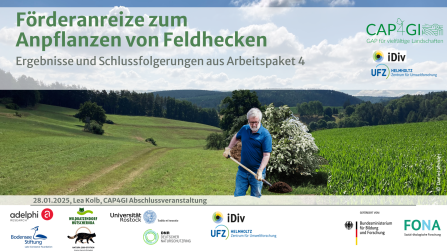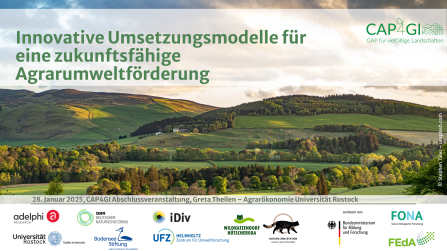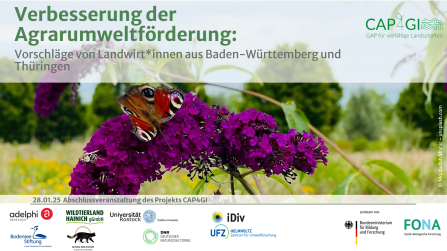WP 1 - exchange platforms with farmers in Baden-Württemberg & Thuringia
Multi-level Exchange Platforms for Biodiversity Conservation in Agricultural Landscapes
Results paper: "More Biodiversity through the CAP - Solutions Proposed by Practitioners in Baden-Württemberg'" (in German)
March 2025
Carolina Wackerhagen, Christine Kewes
Article: Multi-level Exchange Platforms for Biodiversity Conservation in Agricultural Landscapes
Social Innovations Journal ,Vol. 22 (2023)
Sarah Velten, Christine Kewes, Ronald Brudler, Katrina Marsden, Greta Theilen
The loss of biodiversity continues unhalted globally. Agriculture plays a crucial role because it is both heavily dependent on the ecosystem services based on biodiversity and, with its current practices, a main driver of the loss of natural biodiversity. In Europe, the Common Agricultural Policy (CAP) plays a crucial role in shaping agricultural land use. However, despite the inclusion of environmental goals and measures, it has not been able to reverse the trend for biodiversity in agricultural landscapes. One reason for this ‘ecological ineffectiveness’ is the low uptake of environmental measures by European farmers. The project named CAP4GI was conceived to develop policy recommendations to improve the implementation of the current CAP as well as the design of future agricultural policies after the end of the current funding period. It focuses not only on ways to render measures more ecologically effective but also more economically and socially feasible for farms. For that purpose, CAP4GI takes a transformative co-design approach. The core element of the co-design is the realization of a multi-level stakeholder exchange platform process in two German federal states (Baden-Württemberg and Thuringia). In this article, we present and describe our multi-level exchange platform approach and relate our experiences from the first (out of three) years of the platform process. Additionally, we reflect on the transformative potential of this multi-level approach as well as on potential barriers to the realization of this potential.
Report: Barriers to implementation of environmental measures on agricultural land in Thuringia and Baden-Württemberg: Results of scoping interviews and first exchange platforms in the context of project CAP4GI (German only)
Carolina Wackerhagen, Christine Kewes, Ronald Brudler, Sarah Velten
WP2 - Farm economics, preferences and agri-environmental policy
Article: "Digging into Complexity: The Wicked Problem of Peatland Protection"
Advanced Sustainable Systems (2024)
Marie Meyer-Jürshof, Greta Sophie Theilen, Sebastian Lakner
The significance of rewetting peatlands, as a key instrument for peatland protection and response to climate change, is increasingly recognized by both experts and the public. Its widespread implementation however still faces numerous challenges. Characteristics of the issue itself as well as the corresponding policies transform the issue into a wicked problem. Showcasing the lack of clarity in funding structures at the German national and federal-state levels highlights the linked obstruction of necessary actions, implementation options, and financial resources for peatland protection. This poses challenges to climate protection, adaptation efforts, and the achievement of related Sustainable Development Goals. In Germany, an update of peatland protection policies highlights the structural challenges in coordinating peatland protection efforts and helps identify gaps and opportunities. A mixed methods approach is used to analyze both strategic documents and the results of a survey on associated funding. The results indicate a multi-level policy structure with several German federal states recognizing the potential and relevance of peatland protection but still facing obstacles regarding the distribution of responsibilities, data availability, and overall structures. Recognizing peatland protection as a wicked problem can highlight research gaps and help in developing individual solutions that can be transferred to an international level.
WP5 - Individual-based Modelling & Collection of ecological data
Article: Developing multidisciplinary mechanistic models: challenges and approaches
Socio-Environmental Systems Modelling, Vol. 6 (2024)
Daniel Vedder, Samuel M. Fischer, Kerstin Wiegand, Guy Pe'er
Current biodiversity models often struggle to represent the complexity of global crises, as the affected ecosystems are shaped by many different ecological, physical, and social processes. To understand these dynamics better, we will need to build larger and more complex ecological models, and couple ecological models to models produced by other disciplines, such as climate science, economics, or sociology. However, constructing such integrated models is a significant technical undertaking, which has received little attention by ecological modellers so far. We review literature from computer science and several other environmental modelling disciplines to identify common challenges and possible strategies when creating large integrated models. We show that there is a software-architectural trade-off between modularity and integration, where the former is required to keep the technical complexity of a model manageable, and the latter is desirable to represent the scientific complexity of a studied system. We then present and compare five different software engineering techniques for navigating this trade-off. Which technique is most suitable for a given model depends on the model’s aims and the available development resources. The larger a model becomes, the more important it is to use more advanced techniques, such as integrating models from different domains using a model coupling framework. Our review shows that ecological modellers can learn from other modelling disciplines, but also need to invest in increased software engineering expertise, if they want to build models that can represent the numerous processes affecting ecosystems and biodiversity loss.
Summary of master thesis: Butterfly and plant diversity at the margins between agricultural and agriculturally influenced areas
across an intensity gradient in Thuringia (German only)
by Lea Kahoun (supervised by Guy Pe'er), 2024
Policy Recommendations
Using the potential of the CAP for more biodiversity: Impulses from practice in Thuringia and Baden-Württemberg
CAP4GI Policy Brief, May 2024 (in German, tailored to Germany)
Sarah Velten, Björn Pasemann, Ronald Brudler, Greta Theilen, Carolina Wackerhagen, Christine Kewes, Sebastian Lakner, Guy Pe'er
Harnessing the Potential of the CAP for more Biodiversity: Policy Recommendations from a Dialogue with Farmers in Germany
CAP4GI Policy Brief, Decemeber 2024 (in English, tailored to EU level)
Ronald Brudler, Sarah Velten, Björn Pasemann, Greta Theilen, Carolina Wackerhagen, Christine Kewes, Sebastian Lakner, Guy Pe'er
Policy recommendations from the closing event of CAP4GI (in German)
January 2025
Videos
CAP4GI-Einblicke 01/2024
CAP4GI-Einblicke 08/2023
Arbeitspakete 2 und 3: Sozio-ökonomische Untersuchung
Entscheidungen und Präferenzen von Landwirt*innen verstehen
Arbeitspaket 4: ABM
Wie verändern alternative Ansätze der Förderung von Umweltmaßnahmen die Landschaft? Einblicke in ein sozial-ökonomisches Modell
Arbeitspaket 5:
Wie reagiert die Natur? Ein Computermodell als Entscheidungshilfe für eine naturfreundliche Landwirtschaft
CAP4GI online discussion, March 2, 2023 (in German)
Zum Newsbeitrag über die Online-Diskussionsrunde
Vortrag "GAP - aktuelle Herausforderungen" - Sebastian Lakner
|
|
Vortrag "Neue GAP, neue Chancen" - Guy Pe'er
Vortrag "Einführung CAP4GI" - Sarah Velten
Transformations Conference 2023, Prague, July 12 to 14 2023
ECEM 2023 - European Conference on Ecological Modeling, September 4-8, 2023 & GfÖ Annual Meeting 2023 September 12 to 16, 2023, both in Leipzig
FEdA-Statuskonferenz, Frankfurt/online, May 13 2024 (in German)
Presentation of first results and lessons learned of CAP4GI (in German)
Parliamentary Breakfast, 14 May 2024, Berlin
Landscape Conference 2024, Berlin, September 17 to 19, 2024
German Nature Conservation Conference 2024, Saarbrücken, 24 to 27 September, 2024
CAP4GI Closing Event "Pathways to a better CAP - effective for biodiversity, attractive for farmers", Berlin, January 28, 2025
all presentations are availbale in German only
Opening address, Dr. Julian Taffner, FEdA Central Coordination
"CAP4GI : Project overview", Dr. Sarah Velten
"Incentives for Planting Field Hedges: Results and Conclusions from Work Package 4", Lea Kolb
"Persefone.jl: simulating biodiversity in agricultural landscapes", Daniel Vedder
"Innovative Implementation Models for Sustainable Agri-Environmental Support", Greta Theilen
"Improving Agri-Environmental Support: Recommendations from Farmers in Baden-Württemberg and Thuringia", Carolina Wackerhagen und Dr. Ronald Brudler
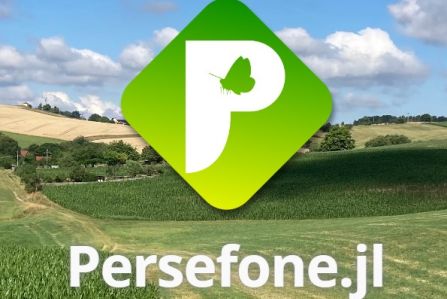
Persefone.jl - Website for the socio-ecological model, which is being developed by the CAP4GI project partner Helmholtz Centre for Environmental Research / Centre for Integrative Biodiversity Research (UFZ/iDiv). The model simulates agricultural practice, plant growth and biodiversity at the landscape level and represents a link between previously separately conceptualised socio-economic and ecological models.
